The Impact of Excessive Profits on Human Dignity and Society
VerifiedAdded on 2023/06/03
|8
|1253
|462
Essay
AI Summary
This essay explores the issue of excessive profits in business, examining its detrimental effects on human dignity and the common good. It delves into the causes of excessive profits, including lack of regulation, high demand, monopolies, lack of business ethics, and consumer unawareness. The essay then proposes several control measures, such as automating businesses through information systems, creating awareness among stakeholders, maintaining ethical standards, and developing innovative computer programs to monitor business ethics. The author emphasizes the role of government in regulating business practices and embracing technology to ensure fair profits and protect consumers. The work uses the context of a business information system and relates to the diploma program to provide a comprehensive analysis of the subject.

BUSINESS 1
Business
Name
ID
Course
Unit
Lecture
Date
Business
Name
ID
Course
Unit
Lecture
Date
Paraphrase This Document
Need a fresh take? Get an instant paraphrase of this document with our AI Paraphraser

BUSINESS 2
Table of contents
Executive summary ……………………………………………………………………………… 3
Introduction ………………………………………………………………………………………4
Causes of high profits in business ……………………………………………………………….5
How to control businesses from getting excess profits ………………………………………….6
Conclusion ……………………………………………………………………………………….7
References ……………………………………………………………………………………….8
Table of contents
Executive summary ……………………………………………………………………………… 3
Introduction ………………………………………………………………………………………4
Causes of high profits in business ……………………………………………………………….5
How to control businesses from getting excess profits ………………………………………….6
Conclusion ……………………………………………………………………………………….7
References ……………………………………………………………………………………….8
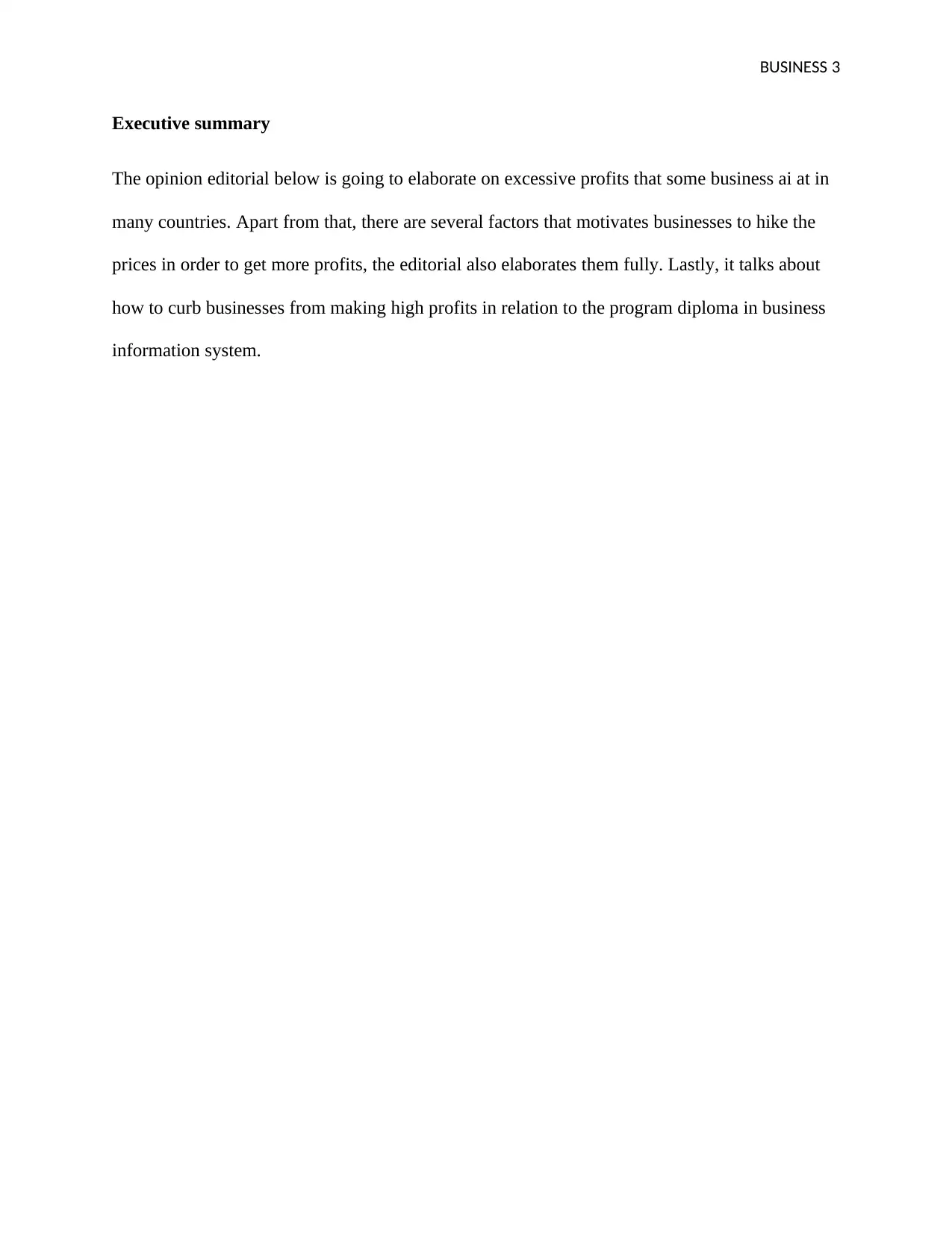
BUSINESS 3
Executive summary
The opinion editorial below is going to elaborate on excessive profits that some business ai at in
many countries. Apart from that, there are several factors that motivates businesses to hike the
prices in order to get more profits, the editorial also elaborates them fully. Lastly, it talks about
how to curb businesses from making high profits in relation to the program diploma in business
information system.
Executive summary
The opinion editorial below is going to elaborate on excessive profits that some business ai at in
many countries. Apart from that, there are several factors that motivates businesses to hike the
prices in order to get more profits, the editorial also elaborates them fully. Lastly, it talks about
how to curb businesses from making high profits in relation to the program diploma in business
information system.
⊘ This is a preview!⊘
Do you want full access?
Subscribe today to unlock all pages.

Trusted by 1+ million students worldwide
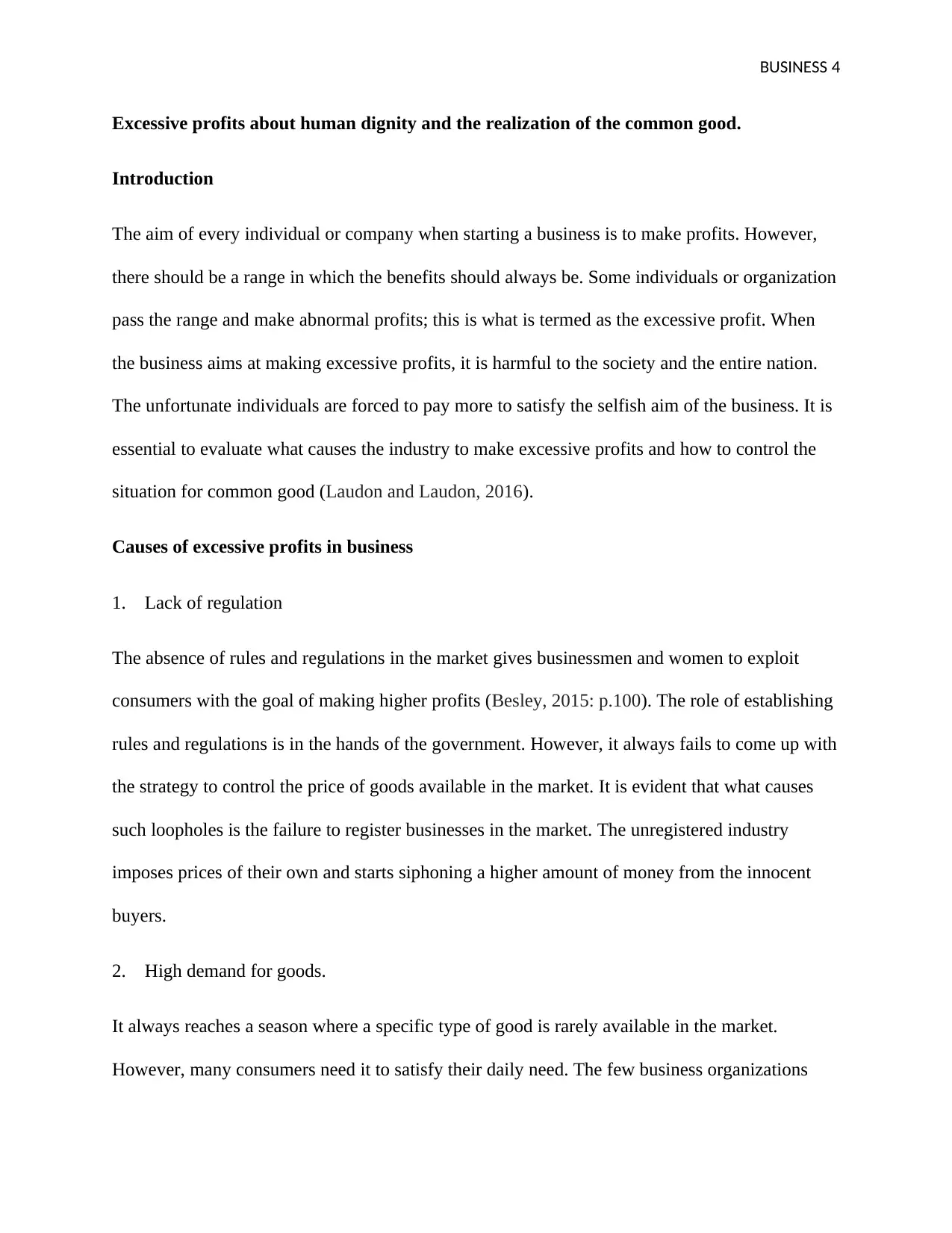
BUSINESS 4
Excessive profits about human dignity and the realization of the common good.
Introduction
The aim of every individual or company when starting a business is to make profits. However,
there should be a range in which the benefits should always be. Some individuals or organization
pass the range and make abnormal profits; this is what is termed as the excessive profit. When
the business aims at making excessive profits, it is harmful to the society and the entire nation.
The unfortunate individuals are forced to pay more to satisfy the selfish aim of the business. It is
essential to evaluate what causes the industry to make excessive profits and how to control the
situation for common good (Laudon and Laudon, 2016).
Causes of excessive profits in business
1. Lack of regulation
The absence of rules and regulations in the market gives businessmen and women to exploit
consumers with the goal of making higher profits (Besley, 2015: p.100). The role of establishing
rules and regulations is in the hands of the government. However, it always fails to come up with
the strategy to control the price of goods available in the market. It is evident that what causes
such loopholes is the failure to register businesses in the market. The unregistered industry
imposes prices of their own and starts siphoning a higher amount of money from the innocent
buyers.
2. High demand for goods.
It always reaches a season where a specific type of good is rarely available in the market.
However, many consumers need it to satisfy their daily need. The few business organizations
Excessive profits about human dignity and the realization of the common good.
Introduction
The aim of every individual or company when starting a business is to make profits. However,
there should be a range in which the benefits should always be. Some individuals or organization
pass the range and make abnormal profits; this is what is termed as the excessive profit. When
the business aims at making excessive profits, it is harmful to the society and the entire nation.
The unfortunate individuals are forced to pay more to satisfy the selfish aim of the business. It is
essential to evaluate what causes the industry to make excessive profits and how to control the
situation for common good (Laudon and Laudon, 2016).
Causes of excessive profits in business
1. Lack of regulation
The absence of rules and regulations in the market gives businessmen and women to exploit
consumers with the goal of making higher profits (Besley, 2015: p.100). The role of establishing
rules and regulations is in the hands of the government. However, it always fails to come up with
the strategy to control the price of goods available in the market. It is evident that what causes
such loopholes is the failure to register businesses in the market. The unregistered industry
imposes prices of their own and starts siphoning a higher amount of money from the innocent
buyers.
2. High demand for goods.
It always reaches a season where a specific type of good is rarely available in the market.
However, many consumers need it to satisfy their daily need. The few business organizations
Paraphrase This Document
Need a fresh take? Get an instant paraphrase of this document with our AI Paraphraser
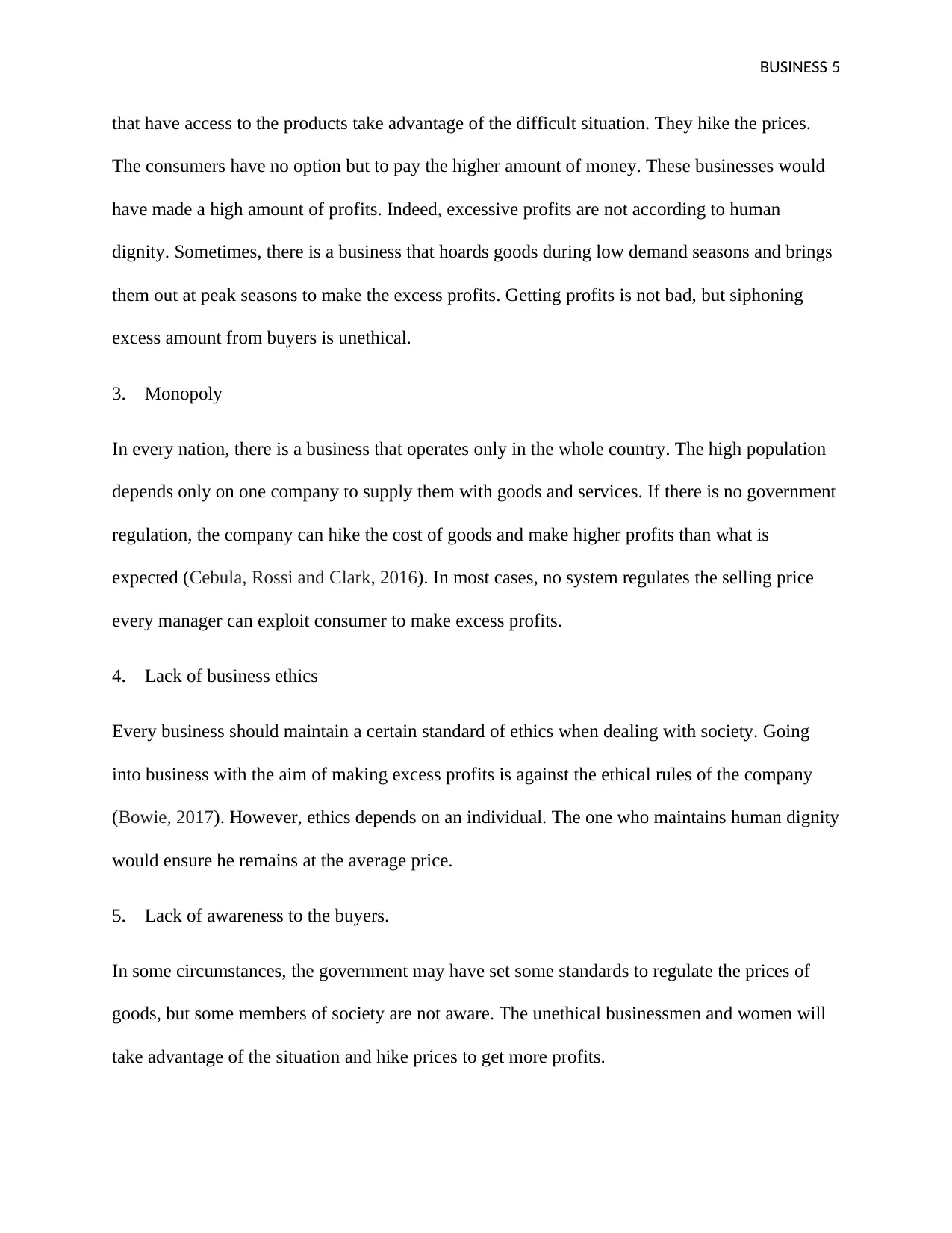
BUSINESS 5
that have access to the products take advantage of the difficult situation. They hike the prices.
The consumers have no option but to pay the higher amount of money. These businesses would
have made a high amount of profits. Indeed, excessive profits are not according to human
dignity. Sometimes, there is a business that hoards goods during low demand seasons and brings
them out at peak seasons to make the excess profits. Getting profits is not bad, but siphoning
excess amount from buyers is unethical.
3. Monopoly
In every nation, there is a business that operates only in the whole country. The high population
depends only on one company to supply them with goods and services. If there is no government
regulation, the company can hike the cost of goods and make higher profits than what is
expected (Cebula, Rossi and Clark, 2016). In most cases, no system regulates the selling price
every manager can exploit consumer to make excess profits.
4. Lack of business ethics
Every business should maintain a certain standard of ethics when dealing with society. Going
into business with the aim of making excess profits is against the ethical rules of the company
(Bowie, 2017). However, ethics depends on an individual. The one who maintains human dignity
would ensure he remains at the average price.
5. Lack of awareness to the buyers.
In some circumstances, the government may have set some standards to regulate the prices of
goods, but some members of society are not aware. The unethical businessmen and women will
take advantage of the situation and hike prices to get more profits.
that have access to the products take advantage of the difficult situation. They hike the prices.
The consumers have no option but to pay the higher amount of money. These businesses would
have made a high amount of profits. Indeed, excessive profits are not according to human
dignity. Sometimes, there is a business that hoards goods during low demand seasons and brings
them out at peak seasons to make the excess profits. Getting profits is not bad, but siphoning
excess amount from buyers is unethical.
3. Monopoly
In every nation, there is a business that operates only in the whole country. The high population
depends only on one company to supply them with goods and services. If there is no government
regulation, the company can hike the cost of goods and make higher profits than what is
expected (Cebula, Rossi and Clark, 2016). In most cases, no system regulates the selling price
every manager can exploit consumer to make excess profits.
4. Lack of business ethics
Every business should maintain a certain standard of ethics when dealing with society. Going
into business with the aim of making excess profits is against the ethical rules of the company
(Bowie, 2017). However, ethics depends on an individual. The one who maintains human dignity
would ensure he remains at the average price.
5. Lack of awareness to the buyers.
In some circumstances, the government may have set some standards to regulate the prices of
goods, but some members of society are not aware. The unethical businessmen and women will
take advantage of the situation and hike prices to get more profits.
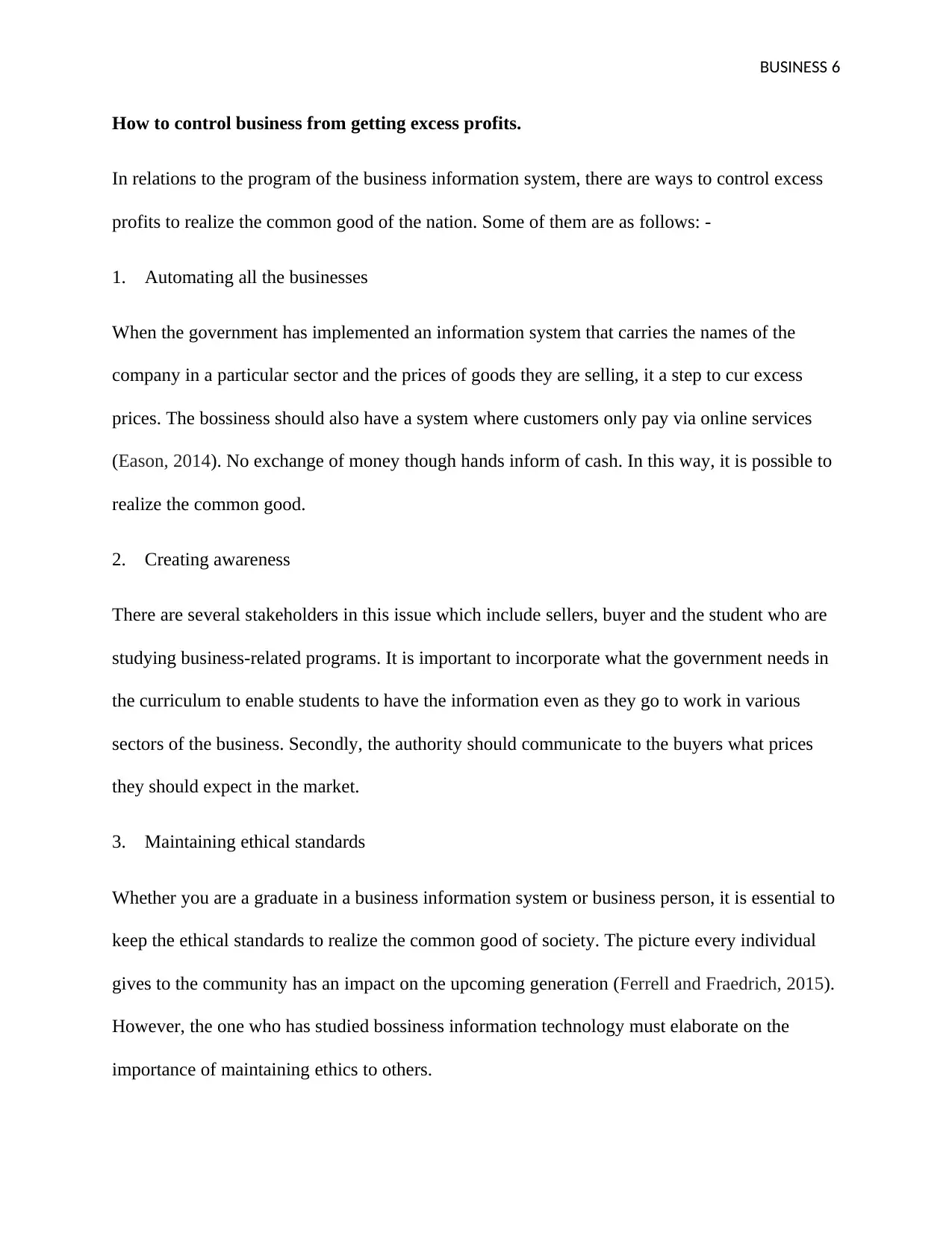
BUSINESS 6
How to control business from getting excess profits.
In relations to the program of the business information system, there are ways to control excess
profits to realize the common good of the nation. Some of them are as follows: -
1. Automating all the businesses
When the government has implemented an information system that carries the names of the
company in a particular sector and the prices of goods they are selling, it a step to cur excess
prices. The bossiness should also have a system where customers only pay via online services
(Eason, 2014). No exchange of money though hands inform of cash. In this way, it is possible to
realize the common good.
2. Creating awareness
There are several stakeholders in this issue which include sellers, buyer and the student who are
studying business-related programs. It is important to incorporate what the government needs in
the curriculum to enable students to have the information even as they go to work in various
sectors of the business. Secondly, the authority should communicate to the buyers what prices
they should expect in the market.
3. Maintaining ethical standards
Whether you are a graduate in a business information system or business person, it is essential to
keep the ethical standards to realize the common good of society. The picture every individual
gives to the community has an impact on the upcoming generation (Ferrell and Fraedrich, 2015).
However, the one who has studied bossiness information technology must elaborate on the
importance of maintaining ethics to others.
How to control business from getting excess profits.
In relations to the program of the business information system, there are ways to control excess
profits to realize the common good of the nation. Some of them are as follows: -
1. Automating all the businesses
When the government has implemented an information system that carries the names of the
company in a particular sector and the prices of goods they are selling, it a step to cur excess
prices. The bossiness should also have a system where customers only pay via online services
(Eason, 2014). No exchange of money though hands inform of cash. In this way, it is possible to
realize the common good.
2. Creating awareness
There are several stakeholders in this issue which include sellers, buyer and the student who are
studying business-related programs. It is important to incorporate what the government needs in
the curriculum to enable students to have the information even as they go to work in various
sectors of the business. Secondly, the authority should communicate to the buyers what prices
they should expect in the market.
3. Maintaining ethical standards
Whether you are a graduate in a business information system or business person, it is essential to
keep the ethical standards to realize the common good of society. The picture every individual
gives to the community has an impact on the upcoming generation (Ferrell and Fraedrich, 2015).
However, the one who has studied bossiness information technology must elaborate on the
importance of maintaining ethics to others.
⊘ This is a preview!⊘
Do you want full access?
Subscribe today to unlock all pages.

Trusted by 1+ million students worldwide
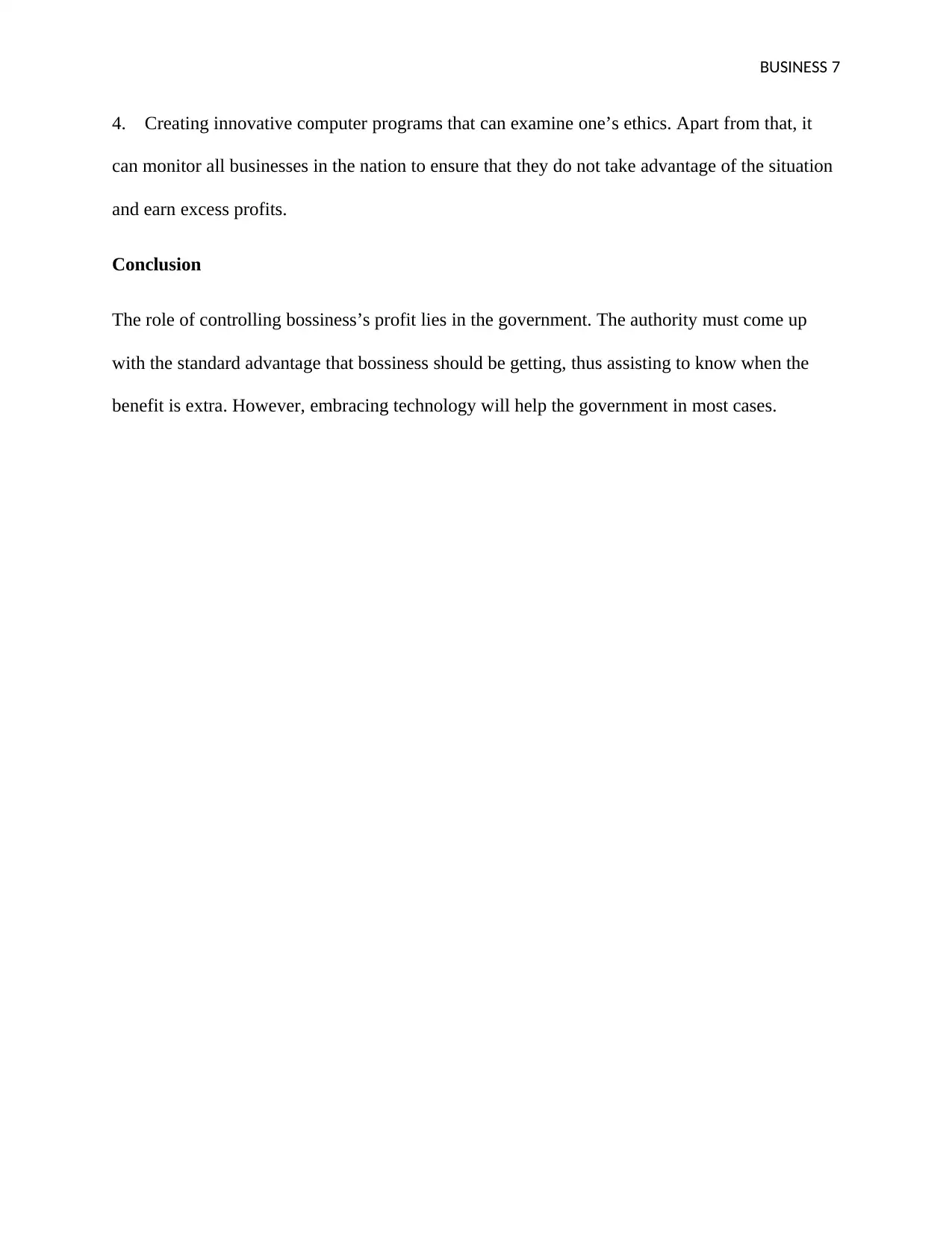
BUSINESS 7
4. Creating innovative computer programs that can examine one’s ethics. Apart from that, it
can monitor all businesses in the nation to ensure that they do not take advantage of the situation
and earn excess profits.
Conclusion
The role of controlling bossiness’s profit lies in the government. The authority must come up
with the standard advantage that bossiness should be getting, thus assisting to know when the
benefit is extra. However, embracing technology will help the government in most cases.
4. Creating innovative computer programs that can examine one’s ethics. Apart from that, it
can monitor all businesses in the nation to ensure that they do not take advantage of the situation
and earn excess profits.
Conclusion
The role of controlling bossiness’s profit lies in the government. The authority must come up
with the standard advantage that bossiness should be getting, thus assisting to know when the
benefit is extra. However, embracing technology will help the government in most cases.
Paraphrase This Document
Need a fresh take? Get an instant paraphrase of this document with our AI Paraphraser
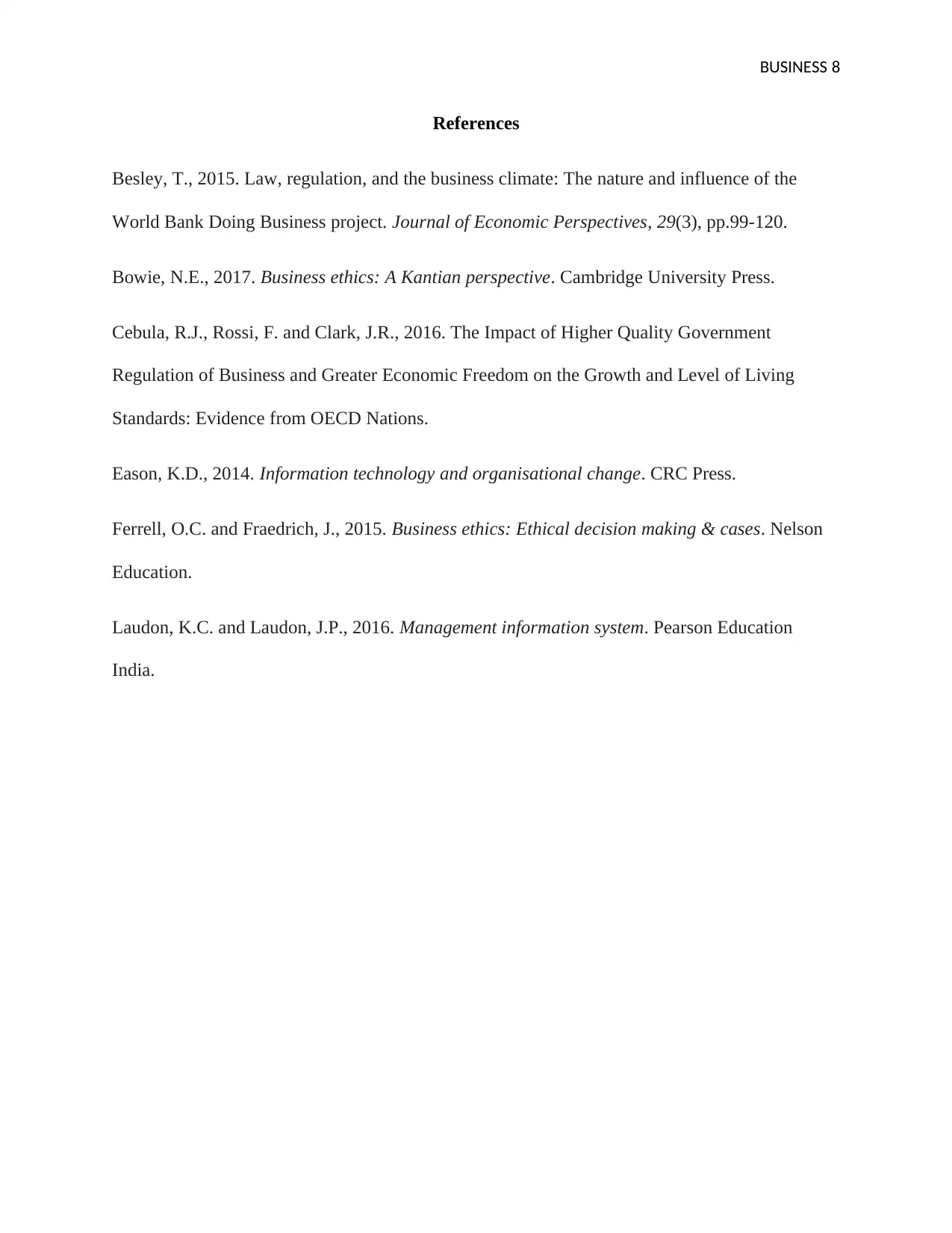
BUSINESS 8
References
Besley, T., 2015. Law, regulation, and the business climate: The nature and influence of the
World Bank Doing Business project. Journal of Economic Perspectives, 29(3), pp.99-120.
Bowie, N.E., 2017. Business ethics: A Kantian perspective. Cambridge University Press.
Cebula, R.J., Rossi, F. and Clark, J.R., 2016. The Impact of Higher Quality Government
Regulation of Business and Greater Economic Freedom on the Growth and Level of Living
Standards: Evidence from OECD Nations.
Eason, K.D., 2014. Information technology and organisational change. CRC Press.
Ferrell, O.C. and Fraedrich, J., 2015. Business ethics: Ethical decision making & cases. Nelson
Education.
Laudon, K.C. and Laudon, J.P., 2016. Management information system. Pearson Education
India.
References
Besley, T., 2015. Law, regulation, and the business climate: The nature and influence of the
World Bank Doing Business project. Journal of Economic Perspectives, 29(3), pp.99-120.
Bowie, N.E., 2017. Business ethics: A Kantian perspective. Cambridge University Press.
Cebula, R.J., Rossi, F. and Clark, J.R., 2016. The Impact of Higher Quality Government
Regulation of Business and Greater Economic Freedom on the Growth and Level of Living
Standards: Evidence from OECD Nations.
Eason, K.D., 2014. Information technology and organisational change. CRC Press.
Ferrell, O.C. and Fraedrich, J., 2015. Business ethics: Ethical decision making & cases. Nelson
Education.
Laudon, K.C. and Laudon, J.P., 2016. Management information system. Pearson Education
India.
1 out of 8
Related Documents
Your All-in-One AI-Powered Toolkit for Academic Success.
+13062052269
info@desklib.com
Available 24*7 on WhatsApp / Email
![[object Object]](/_next/static/media/star-bottom.7253800d.svg)
Unlock your academic potential
Copyright © 2020–2026 A2Z Services. All Rights Reserved. Developed and managed by ZUCOL.





